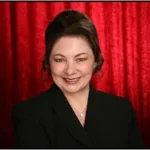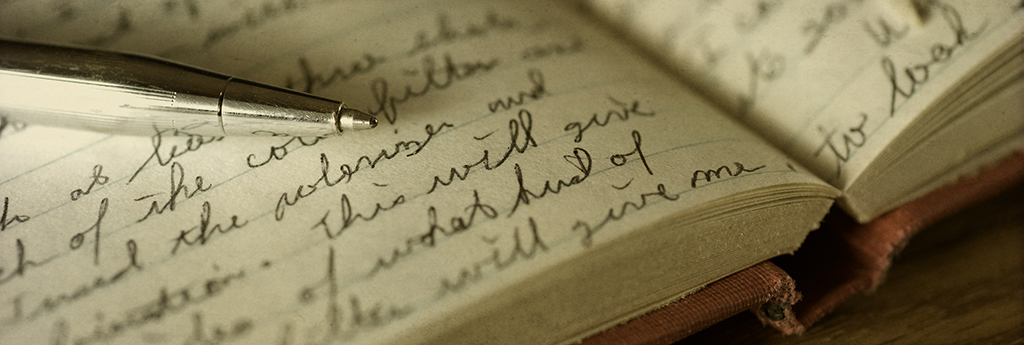
Lita’s recent discussion with editor Sharon Rose grew into a two-part author interview; the first part on the process of writing, and the second about Lita’s present releases and upcoming new books. Part 1 on “Being a Writer” is presented below.
- Q: Lita, thank you for taking the time to chat. You did a podcast that included some information on the process of writing, and I thought there was some good information there. I understand that you are on your eleventh book, so there are probably some things you could share about how you got started, and how you hone your work. Can we talk about writing?
A: Sure. Thanks for asking. What would you like to know?
- Q: At some point in a person’s life, they have an experience that indicates a direction to follow. For a writer it’s words, so you must have figured out early how powerful words can be. Can you recall the first time you realized that your words had power, and did that experience make you think you could or should become a writer?
A: My first recognition as a writer was when I wrote my first poems at fourteen. I showed my parents and they approved, but my grandmother went further by telling me I ‘had promise,’ and that ‘if I wrote enough I could make a book’. A book? I hadn’t thought of that before.
Two years later, I took an expository writing class in high school. The first assignment was to pick a fruit and write about it. I picked a lemon. The next day we handed in our papers for grading, and the following day the teacher handed them back so we could take turns reading them. I was surprised that everyone else had only written from one paragraph to one page. After most of the class had been called on to read theirs, the teacher called on me to do the same. I had written seven pages, writing about each exposed layer of a lemon with its texture, aroma, and taste. At home, we grew lots of lemons. At the end of the first page, she said I could stop. She told the class that what I had written was of the amount and detail that she hoped they would be able to do by the end of the semester. I was both flattered and embarrassed, immediately became the teacher’s pet, which garnered me extra attention, but the other students avoided me.
I was helped by my father with my writing and presenting papers. He was an environmentalist for the state of California, so he had to write and present environmental analysis and impact reports. Probably by necessity, he joined Toastmasters and eventually served a term as its president. Members learn to choose the right words in the right way when speaking. So he coached me whenever I had a presentation to give in school, and helped me to write so those words flowed. One of his mottoes was to use his three “I’s,” to be instructive, illustrative, and illuminating, for my audience. All that writing and presenting helped me a great deal through college, university, and my years at the Institute. So, I always knew that once I got through the workaday business of earning a living, I would be a full-time writer. Of course, I wrote all along the way, just because it felt like the natural thing to do. One could become a writer overnight, but it would be rare. It takes years of practice to develop the skill.
- Q: Your first published book was of poetry. Writing poetry is very different from writing prose. What was it that appealed to you to express yourself in this way? And how did you shift to writing a cookbook?
A: I had angst about the world while I was a teenager, living through the late sixties to mid-seventies. There was the possibility of nuclear devastation to our planet and the pointless loss of lives with the Vietnam War. One could demonstrate against those things or work through them philosophically, and poetry can help get those feelings out without getting arrested. I had two poems about war published in my school paper. And, I was learning how to fall in love. Emotions were running high for many reasons. Many of those first published poems were from my younger years, and then arranged later for book publication. The cookbook was born of a need to get Thelemic feasts to Thelemites. I was dedicated to leading and teaching, but also to feeding members. I was a chef, and involved in magical orders, all for more than twenty years. It seemed the next logical step.
- Q: Then you went on to write a trilogy of international crime and mystery, each of which takes place in a different part of Europe. I’d like to ask you about how your travels affect your writing. Do you go on pilgrimages to learn and write about a place, do you plan your journeys based on research you’ve already done and are filling in, or do you travel in order to inspire books yet to come?
A: Since a pilgrimage implies a planned sacred purpose, I’ve been on pilgrimages to two different places. I went to Egypt in 1984 to visit as many ancient Egyptian temples as possible, and again in 2004, to celebrate the 100th anniversary of when The Book of the Law was written. I wrote an article about the experience, called The Pilgrimage. The second place was a pilgrimage to the south of France, following the Cathar and Templar trails, visiting their strongholds and castles. I wrote an article about this trip, called A Study of the Knights Templar. I usually write about a place after I have been there. For the most part, my husband and I just like to travel in order to learn about the world and its people.
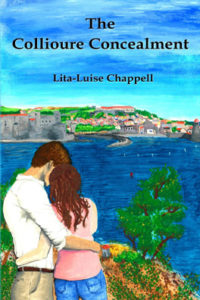 I might set off with the intention of writing about a place, but I don’t know how a place will affect me until I get there. I was riding up in the Klein Matterhorn Aerial Tramway in the Swiss Alps, thinking that I would be writing about how quiet and peaceful it would surely be to stand surrounded by nothing but white snow. But when I stood as the last person on the platform waiting for the last car to descend for the day, I was startled. I found that the sound of the movement of the ice cracking under its own weight from melt from the day, was noisy and much more fascinating. The experience came to be included in one of my travel diaries, and will go into a future “best of favorite places I’ve been to”. I visited Collioure, France, four times before I was inspired to write The Collioure Concealment. I was captivated from the start, but it took me that long to see the story it held for my first novel.
I might set off with the intention of writing about a place, but I don’t know how a place will affect me until I get there. I was riding up in the Klein Matterhorn Aerial Tramway in the Swiss Alps, thinking that I would be writing about how quiet and peaceful it would surely be to stand surrounded by nothing but white snow. But when I stood as the last person on the platform waiting for the last car to descend for the day, I was startled. I found that the sound of the movement of the ice cracking under its own weight from melt from the day, was noisy and much more fascinating. The experience came to be included in one of my travel diaries, and will go into a future “best of favorite places I’ve been to”. I visited Collioure, France, four times before I was inspired to write The Collioure Concealment. I was captivated from the start, but it took me that long to see the story it held for my first novel.
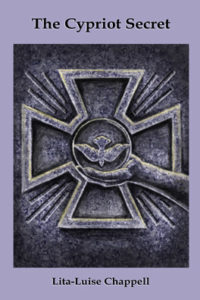 I have written about places that I have not been to yet, such as Cyprus. It is so much easier now for anyone to learn about a place, when one can just go to a computer. With the Internet, a person can immediately see pictures, detailed maps, real time video, and even hear the sound of a native bird. Of the 195 countries in the world, at least fifty of them have maps which can zoom in close enough to see the terrain and buildings. And the history and description of every place in the world is well described in many places from multiple listing pages. Travel site reviews and their pictures can be especially telling, from tourists that have been to those places. One does not need to go to a place to write about it, but it greatly helps to have an inside look and feel for a place, if one does. I did go to Malta after I had placed it as the final setting in The Cypriot Secret. Most of the places I write about, I have been to and found something that inspired me to make them a location choice.
I have written about places that I have not been to yet, such as Cyprus. It is so much easier now for anyone to learn about a place, when one can just go to a computer. With the Internet, a person can immediately see pictures, detailed maps, real time video, and even hear the sound of a native bird. Of the 195 countries in the world, at least fifty of them have maps which can zoom in close enough to see the terrain and buildings. And the history and description of every place in the world is well described in many places from multiple listing pages. Travel site reviews and their pictures can be especially telling, from tourists that have been to those places. One does not need to go to a place to write about it, but it greatly helps to have an inside look and feel for a place, if one does. I did go to Malta after I had placed it as the final setting in The Cypriot Secret. Most of the places I write about, I have been to and found something that inspired me to make them a location choice.
- Q: Do you keep a diary for every trip that you take and country you visit? In your stories, you write a lot about the local areas, at times like a travelogue. Do you draw from your travel notes? Can you tell us more about your journaling process when you travel, and how important it is for you to keep a travel diary?
A: I have found that keeping a travel diary is essential. First of all, when my husband and I travel, we fit a lot into our journey, and memory is a tricky thing. A diary helps us keep track of where we’ve been, when, and what we did. We like to go back and look at my husband’s photographs and what I wrote. In reviewing, we might actually remember something else that happened, which I can add to my notes. I’m thankful when I have written about how I felt about a place, indicating a general ambiance. It takes us right back to that moment. I may go into detail on the look of a town, an unusual building, or the way the light fell over a churchyard.
I sometimes write about a particular captivating activity. Maybe about the things a museum offered that impressed me the most. Or I might be having coffee at a port café in Portugal and decide to write about the way a nearby fisherman is mending his nets, with a pelican standing on a post watching over his shoulder, and a cat below watching fascinated. I might write portions of an interesting conversation, or want to note the look of a person as a captivating character. There have been times writing when I needed an interesting character. Then I remember the description of a person I had included in a travel diary that would work. So I retrieve it and put it in. There are many descriptions that have come directly from my travel diaries. This was especially the case for the first two books in the Reynard trilogy, drawing on notes from our four trips to Collioure, France, and two trips to Mystras, Greece.
- Q: With the trilogy, your primary characters live in the “present,” from 2015 in the first book to 2018 in the third. In two of your books you reveal the distant past, first. In your second book, you deal with several shifts in time. Dealing with different time frames must get challenging. How does a writer best deal with that?”
A: It’s important to make the time shift as distinct as possible, with at least its own chapter, and identifying when and where as soon as possible. The writer doesn’t want to confuse the reader, the writer wants to intrigue the reader. If a book begins with a prologue different from the time in which the rest of the book takes place, it needs to be important, revealing a key issue. Many mysteries typically begin with a scene that shocks the reader, often with a murder. All beginnings need to pose in the reader’s mind that critical question of “why”? The first paragraph is critical, but the first sentence is the most important, meant to grab the reader’s attention. Each book in the Reynard trilogy begins with an important previous time to the puzzle, which neatly finds its place later in each book.
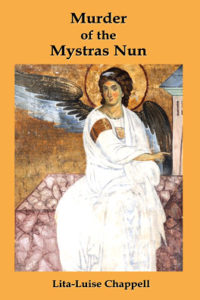 As to how do I keep track of different time frames? It is not easy. In Murder of the Mystras Nun, the book had to cover a period of over two-thousand-years. I had to keep track of the “present day” characters with events each day for several weeks. The time frame for the artist beginning in 1355, was more over his life time. The diary of the inspector had its own calendar days that were different and actually based on real events in Greece that took place in 1715. The final historical journey to Israel was necessary in order to show where the problem had begun. The only way to handle that was to jump in time to allow a character to reveal a critical part of the story. When a character from history can speak right off the page, then history comes alive, even if it is fictional.
As to how do I keep track of different time frames? It is not easy. In Murder of the Mystras Nun, the book had to cover a period of over two-thousand-years. I had to keep track of the “present day” characters with events each day for several weeks. The time frame for the artist beginning in 1355, was more over his life time. The diary of the inspector had its own calendar days that were different and actually based on real events in Greece that took place in 1715. The final historical journey to Israel was necessary in order to show where the problem had begun. The only way to handle that was to jump in time to allow a character to reveal a critical part of the story. When a character from history can speak right off the page, then history comes alive, even if it is fictional.
There are many other things which I must be conscientious about. I have to research every aspect and make sure it keeps within the parameters of the time period. Whether it is deciding what form of transportation the character uses, a workable idiom for that language, a monetary exchange of that country, the lighting that would be used, the political situation, a form of period dress, an appropriate mode of speech, even the way of telling time, by bells or watches. I can’t have a character use a flashlight when it hasn’t been invented yet.
- Q: How do you plot a murder mystery in fiction? Do you start with an idea and see what comes up, or do you pre-plan it all?
A: There are many who have opinions on how to write fiction, but most agree, there are two basic types of writers, “the plotter and the ‘pantser'”. The plotter plans it all out ahead of time with chapter outlines and character profiles, and the pantser has an idea and just writes “by the seat of their pants,” employing aspects of the story as needed. I am primarily a plotter, but will leave some details to inspiration. Every writer works a little differently.
I get an idea for a mystery and immediately write it down. I add to it day after day until I have a workable storyline. I create a primary character, whom I have chosen to deliver a message to the reader. The character profile includes what they look like, their family, where they are from, what they do, and firmly establishes certain character traits. I build reasons why that person wants to accomplish the task or deliver that message. I form a basic outline of my ideas, so that I see a beginning establishing setting and premise, a middle with character development and plot advancement, and a rewarding conclusion.
Then I go through the outline and list all the things that I want to have happen, and put them in the correct order they need to occur. Each one or two of those sub-outline listings forms its own chapter. Then I write, fleshing out the idea, creating dialog and description until I have written about each outline heading. One can go into detail, but then there is also plenty of time to add further description, embellishments, and missing clues by simply having them added later on into the narrative. After I have completed a first draft, I start all over again, read it and rewrite it. I will do this many times for each book. When I’m happy with the last copy, I turn it over to the editors, with rewrites scheduled again after their corrections.
- Q: Where do you get the ideas for each of your characters? Are they just made up, do you base them on people you know, or do you see famous actors taking their roles?
A: For the trilogy, the heroine is Chante Morgan, a bright, inquisitive woman, whom I pictured as the actress Evangeline Lilly. For the man she falls in love with, Lucien Reynard, I created a sergeant at the fort, who was a daring individual with investigative curiosity, and who looked like Matt Bomer or Jack Knightley. Admittedly, there is some of Vere and I in their romance. For Lucien’s father, Gervais Reynard, I needed someone with a strong background in European history so I made him a history professor. I used a combination of a real person with the look of an actor. Vere’s father was a well-known professor of early modern philosophy and metaphysics, who wrote books about Descartes, Hume, Hobbes, Locke and others. His questioning mind and certain personality traits that I came to know and love about the man are embodied in the character. I also had Jon Voigt in mind as to how Gervais might look. There is one other actor whom I thought of and that was John Rhys-Davies, when writing about one of the villains. For the other characters in the books, I drew from a combination of people I have known, or just created them anew.
- Q: Writing about what one knows is surely the better way to go about telling a story. You’ve had many careers; in the food industry, in electronics, in the music industry, the publishing industry, and as a sex therapist. You used your food background to write the cookbook, your publishing background to get into publishing your own books, and wrote Sticks and Balls, no doubt from your experience as a therapist. Have you incorporated electronics or music into your writing? And how important is it to write about what you know?
A: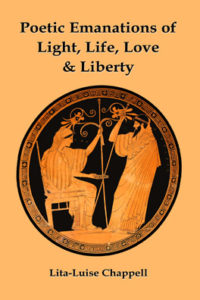 I have actually written several songs. One, The Language of Love, was presented as a work of poetry in my first book, Poetic Emanations of Light, Life, Love & Liberty. I have not included written works dealing with electronics. Maybe I’ll make laser light a form of wonder or the cause of death in a future book.
I have actually written several songs. One, The Language of Love, was presented as a work of poetry in my first book, Poetic Emanations of Light, Life, Love & Liberty. I have not included written works dealing with electronics. Maybe I’ll make laser light a form of wonder or the cause of death in a future book.
When a writer has written about what they know, the reader gets the added advantage of a particularly accurate je ne sais quoi for the place. It just smacks closer to an actual and more believable experience. A good author can go there without having been to the place or experience, but it does take more research and careful wording
. - Q: What recommendations would you a give a person who wants to write poetry, cookbooks, or fiction? Are they so very different from each other?
A: They are different. For poetry, the most important thing to me, is getting a feeling put into words. It doesn’t have to rhyme or have meter, but it must fulfill an inner feeling, and when written, fully convey what is felt. Then I work on its structure with a good rhythm and search for words that purposely rhyme that will convey the same meaning. Some poems come quickly, but most take work and may take days or years to perfect. There are no failures in poetry, just works in progress, until the writer feels that they are completed.
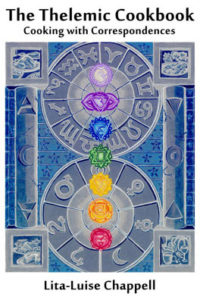 A cookbook needs good recipes and a good way to present them. Anyone can write out a recipe, but creating an interesting format is what sells it. Tell a story, say something about each one, and add a picture if you can. I would love to have had a picture for every one of my 656 recipes in The Thelemic Cookbook, but if I had, the book would have weighed twice what it is now at 4 ½ pounds. My next cookbook will be shorter, weigh less, and have lots of pictures, I promise.
A cookbook needs good recipes and a good way to present them. Anyone can write out a recipe, but creating an interesting format is what sells it. Tell a story, say something about each one, and add a picture if you can. I would love to have had a picture for every one of my 656 recipes in The Thelemic Cookbook, but if I had, the book would have weighed twice what it is now at 4 ½ pounds. My next cookbook will be shorter, weigh less, and have lots of pictures, I promise.
For fiction, the secret is in the details. Focus on the characters, what and how they say things. Then describe more than what they say, do, or where they are. Tell how they feel and what they are thinking. Descriptions can be done in a general way like a watercolor picture, or it can be detailed like a Renaissance oil painting. Don’t forget to use all the senses. The smell of something might be more important to what is happening in the story than what is being said. Don’t give away too much in the beginning, measure it out and draw the reader in by leaving a question in the mind of the reader, so they want to turn the page to find out the answer to what happens.
- Q: There must be some basic good-practice trends for writing. What have you found that seems to be what works the best, in fiction or non-fiction.
A: Writing trends do seem to have shifted in this modern era. I have noticed certain trends that do better than others. For one, people read less these days because they have less time. So chapters need to be shorter, generally not more than six pages. Shorter more precise paragraphs are easier to read. Using language more commonly known is better for comprehension. Foreign accents and words need to be used sparingly. It doesn’t hurt to educate, but not too much at one time. A book should relay strong emotion, tell a compelling story, be well written with a moving plot, have great characters that the reader can easily picture or identify with, and have a satisfying ending.
- Q: As both an author and a scholar, we assume you must do a lot of reading along with writing. What are some of your favorite things to read?
A: I do read a lot, generally in the evening. When going through school, I would read psychological and sexological journals. Exploring what people think and how they act and why, is an endless source of material for behavioral exposition. I do tend to favor murder and mysteries, like a psychological thriller, or one with a metaphysical component. I enjoy historical fiction and travel adventure. I’ve gone through periods where I just read ancient history, biographies, cookbooks, folklore, or poetry.
- Q: Writing takes discipline; for some it is easy to write and unload an emotion or experience, or relate a philosophical or spiritual experience. Is writing easy for you? Do you write every day? Do you ever have writer’s block?
A: Before I retired, I worked from home for about fifteen years, so I had plenty of time to develop a good working discipline, on my own. As a writer, I may not work on the same writing project the entire day. I might work on my primary book in the morning, do some poetry in the afternoon, or get a couple pages of writing done on some third project, then go back to my main book in the evening. I may be in writing mode, researching mode, or editing mode, often in the same day. In all, I am at my computer between four and eight hours a day, and produce five to ten pages each day. I do not get writer’s block. I have more to write about than I probably have years to live.
My writing is simply the process of drawing from personal experience and knowledge, often adding my abundant imagination, and getting that down into words. I may draw from my feelings, my travels, people I have met, or frustrations that I have about the world. After that, it is a process of skillfully saying what I mean, giving examples, and expounding upon those words so that others may understand and possibly identify with what I am saying. If one wants to be a writer, write every day. Wanting to be a writer will only keep one wanting. A writer writes. Once good habits form, then words will pour out like water.
About the interviewer: Sharon Rose is a reseller of collectibles, rare books and vintage ephemera, as well as an independent copywriter and editor from Los Angeles. She has been working with books, words and found treasures for over 23 years.
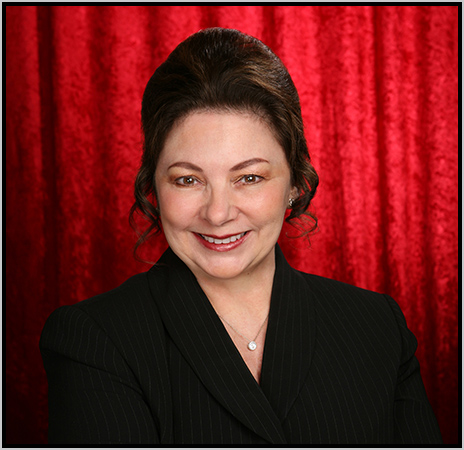 The official website of Lita-Luise Chappell, writer on sex, magic, food, distant lands, and everyday life with articles, poetry, novels, travelogues, rituals, cookbooks, and short-stories.
The official website of Lita-Luise Chappell, writer on sex, magic, food, distant lands, and everyday life with articles, poetry, novels, travelogues, rituals, cookbooks, and short-stories.